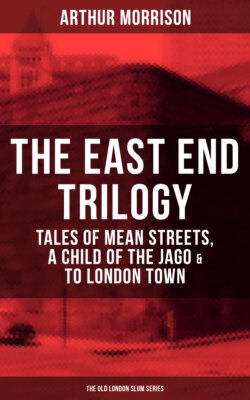Читать книгу THE EAST END TRILOGY: Tales of Mean Streets, A Child of the Jago & To London Town - Morrison Arthur - Страница 19
На сайте Литреса книга снята с продажи.
II.
ОглавлениеON the afternoon of the next day, Bill Napper, in clean moleskins and black coat, made for Old Jewry. On mature consideration he had decided to go through it alone. There was not merely one lawyer, which would be bad enough, but two of them in a partnership; and to take the missis, whose intellects, being somewhat flighty, were quickly divertible by the palaver of which a lawyer was master, would be to distract and impede his own faculties. A male friend might not have been so bad, but Bill could not call to mind one quite cute enough to be of any use, and in any case such a friend would have to be paid for the loss of his day’s work. Moreover, he might imagine himself to hold a sort of interest in the proceeds. So Bill Napper went alone.
Having waited the proper time without the bar in the clerk’s office, he was shown into a room where a middle-aged man sat at a writing-table. There was no other lawyer to be seen. This was a stratagem for which Bill Napper was not prepared. He looked suspiciously about the room, but without discovering anything that looked like a hiding-place. Plainly there were two lawyers, because their names were on the door and on the letter itself; and the letter said we. Why one should hide it was hard to guess, unless it were to bear witness to some unguarded expression. Bill Napper resolved to speak little, and not loud.
The lawyer addressed him affably, inviting him to sit. Then he asked to see the papers that Bill had brought. These were an old testimonial reciting that Bill had been employed “with his brother Benjamin” as a boy in a brick-field, and had given satisfaction; a letter from a parish guardian, the son of an old employer of Bill’s father, certifying that Bill was his father’s son and his brother’s brother; copies of the birth registry of both Bill and his brother procured that morning; and a letter from Australia, the last word from Benjamin, dated eighteen years back. These Bill produced in succession, keeping a firm grip on each as he placed it beneath the lawyer’s nose. The lawyer behaved somewhat testily under this restraint, but Bill knew better than to let the papers out of his possession, and would not be done.
When he had seen all —“Well, Mr. Napper,” said the lawyer, rather snappishly (obviously he was balked), “these things seem all right, and with the inquiries I have already made, I suppose I may proceed to pay you the money. It is a legacy of three hundred pounds. Your brother was married, and I believe his business and other property goes to his wife and children. The money is intact, the estate paying legacy duty and expenses. In cases of this sort there is sometimes an arrangement for the amount to be paid a little at a time as required; that, however, I judge, would not be an arrangement to please you. I hope, at any rate, you will be able to invest the money in a profitable way. I will draw a check.”
Three hundred pounds was beyond Bill Napper’s wildest dreams. But he would not be dazzled out of his caution. Presently the lawyer tore the check from the book and pushed It across the table with another paper. He offered Bill a pen, pointing with his other hand at the bottom of the second paper, and saying: “This is the receipt. Sign just there, please.”
Bill took up the check, but made no movement toward the pen. “Receipt?” he grunted, softly; “receipt wot for? I ain’t ‘ad no money.”
“There’s the check in your hand — the same thing. It’s an order to the bank to hand you the amount — the usual way of paying money in business affairs. If you would rather have the money paid here, I can send a clerk to the bank to get it. Give me the check.”
But again Bill was not to be done. The lawyer, finding him sharper than he expected, now wanted to get this tricky piece of paper back. So Bill only grinned at him, keeping a good hold of the check. The lawyer lost his temper. “Why, damn it,” he said, “you’re a curious person to deal with. D’ye want the money and the check too?”
He rang a bell twice, and a clerk appeared. “Mr. Dixon,” said the lawyer, “I have given this person a check for three hundred pounds. Just take him round to the bank, and get it cashed. Let him sign the receipt at the bank. I suppose,” he added, turning to Bill, “that you won’t object to giving a receipt when you get the money, eh?”
Bill Napper, conscious of his victory, expressed his willingness to do the proper thing at the proper time, and went out with the clerk. At the bank there was little difficulty, except at the clerk’s advice to take the money chiefly in notes, which instantly confirmed Bill in a determination to accept nothing but gold. When all was done, and three hundred sovereigns, carefully counted over for the third and fourth time, were stowed in small bags about his person, Bill, much relieved after his spell of watchfulness, insisted on standing the clerk a drink.
“Ah,” he said, “all you city lawyers an’ clurks are pretty bleed’n’ sharp, I know, but you ain’t done me, an’ I don’t bear no malice. ‘Ave wot you like —‘ave wine or a six o’ Irish — I ain’t goin’ to be stingy. I’m goin’ to do it open an’ free, I am, an’ set a example to men o’ property.”
